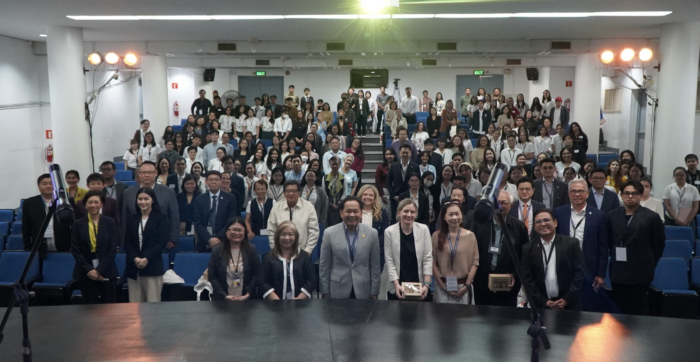
The Council of Asian Liberals and Democrats (CALD), a regional network of liberal and democratic political parties in Asia, successfully hosted their high-profile regional conference, “South China Sea Disputes Under Trump 2.0: Finding a Common Ground Among Claimant States,” on 3 April 2025, at Miriam College, Quezon City. The event brought together leading experts, policymakers, and scholars to tackle pressing issues surrounding the South China Sea, including escalating geopolitical tensions, regional security, and the future of diplomatic negotiations. The conference took place against the backdrop of increasing maritime aggression in the South China Sea. In recent months, the Philippines has reported multiple incidents involving Chinese vessels harassing Filipino fishermen, blocking resupply missions to the BRP Sierra Madre in Ayungin Shoal, and even using water cannons against Philippine Coast Guard ships. With uncertainties looming under a second Trump administration, the need for regional cooperation has never been more critical. A special fireside chat shed light on the human rights and social justice implications of the South China Sea disputes. Leila de Lima, spokesperson of the Liberal Party of the Philippines and ML Partylist nominee, Former Chairperson, Commission on Human Rights, and former Secretary of the Department of Justice, led a compelling discussion on the implications of the South China Sea dispute to Human Rights and Social Justice. “The South China Sea dispute is not just a geopolitical issue—it has deep-rooted social, economic, and environmental consequences for the Philippines and the wider region. It threatens local livelihoods, endangers ecological stability, escalates militarization, undermines international law, displaces vulnerable communities, and exacerbates economic inequality. Addressing these issues requires a combination of legal, diplomatic, and environmental solutions, alongside regional cooperation and adherence to international law. “ De Lima states. The discussion, moderated by Christian Esguerra, host of Facts First, Philippines, delved into the importance of Human Rights in the field of the SCS dispute. The session underscored the necessity of international solidarity in holding aggressors accountable and upholding the rule of law. Esguerra also raised a question with regards to what ASEAN can do when it comes to Human Rights issues. De Lima reiterates that this action is desirable as the ASEAN can bring attention to all of the member states in so far these issues are concerned. This could also instill Human Rights consciousness more further, especially with the South China Sea dispute. “The democratic and rules-based international order is under pressure. The fight for human rights and democracy has not been needed more than now,” said Didrick De Schaetzen, Secretary General of the Alliance of Liberals and Democrats for Europe Party (ALDE Party). With rising tensions in the South China Sea and unpredictable shifts in U.S. foreign policy under a second Trump presidency, CALD reaffirmed its commitment to fostering dialogue and cooperation among claimant states. The conference emphasized that smaller and medium-sized nations must work together to counter unilateral actions by regional powers. By providing a platform for discussion, CALD continues to play a crucial role in promoting multilateral, peaceful solutions to the dispute. CALD Chairperson and Cambodian Senator Mardi Seng underscored this commitment, stating, “Perhaps it is true that we liberals are idealists – that we believe – sometimes to a fault – that individuals and states are reasonable enough to engage in dialogue, to listen to alternative – even contradictory – perspectives, and to enter into compromises.” As tensions in the South China Sea persist, CALD calls on regional leaders to uphold democratic values, safeguard human rights, and ensure that diplomacy prevails over aggression.
|
Categorised in: News Article
This post was written by CALD
 Unit 409, 4/F La Fuerza Plaza 2, 2241 Don Chino Roces Ave. corner Sabio St., 1231 Makati City, Philippines
Unit 409, 4/F La Fuerza Plaza 2, 2241 Don Chino Roces Ave. corner Sabio St., 1231 Makati City, Philippines
 +632 8819 60 71
+632 8819 60 71
 info@cald.org
info@cald.org